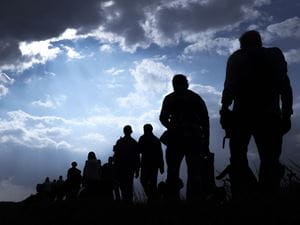
From time to time, when a subject of importance arises, the Bishops in the Church of Ireland will jointly draft an opinion on the matter. Such an epistle made its way to parishes in September. There has been an increase in community tensions, of late, about issues to do with migration: ‘the recent street protests, rise of hate crime and intimidation, and deliberate spreading of fear around topics of racial diversity and immigration,’ as the Letter describes it.
Even though the Letter is addressed to the northern parishes, the Republic has also had a bumpy ride. There was a fire, for example, in a Dublin building that would have housed asylum seekers. I’m not sure how many read these letters; but ‘if one person changes their mind,’ as a man says, ‘then it’ll have been worth it.’ So put away the placards and let’s talk immigration.
I might as well confess that I’m well disposed toward immigration. This is partially due to my professional background. I’d say that around a third of my students are what Barack Obama often termed, in several different speeches over the years, ‘kid[s] with a funny name.’ If it weren’t for those ‘kids with funny names’ coming to piano lessons, I’d need Income Support!
Jokes aside, it’s a privilege to teach a diverse group of kids whose families, or they themselves, hail from across the world. Indeed, it’s a sign of how far Northern Ireland has come that new communities have begun to settle here. Time was when people couldn’t get out quick enough.
Which brings me back to the Bishops and their Letter. We’re all familiar with, as they put it, ‘deliberate spreading of fear around topics of racial diversity and immigration.’ In this basket, we can always find that most classic of myths: “They’re taking our jobs” (Mrs. Carberry from Father Ted). As I write, on Friday, September 27, there are 1,858 vacancies advertised on NI Job Finder, from white-collar to blue-collar. None of us can have up-to-the-minute stats on hand at all times, but a ballpark figure like ‘1,800 jobs’ is good ammo to use on disinformation.
‘Christians have specific obligations to society in general,’ say the Bishops, ‘and also to those from different countries and cultures who share our neighborhoods.’ What are those obligations? Ask Moses: ‘You shall not wrong a stranger or oppress him’ (Exodus 22:21); and as he puts it in a different passage, ‘When a stranger sojourns with you in your land, you shall not do him wrong’ (Leviticus 19:33). These commandments are, ultimately, from God Himself.
There has been, as the Bishops allude, rather a cavalcade of unsavory views expressed of late; I can think of an especially toe-curling clip, in which an older Belfast man is interviewed. This encounter took place yards away from a Syrian-owned supermarket, which had been burned out. Care to hear what our friend’s take on this was? Beware that none of it is pretty:
“As far as I’m concerned, there’s too many foreigners here… This is a white community. It always has been, and it always will be, hopefully… Well, all these Muslims are going to take over sometime… I don’t want them in my area. Simple… I just don’t like them.”
These are views that no right-thinking person would endorse. Christians believe, though, that God’s grace can change people. I hope that, in time, this individual will come to love his neighbors, whoever they may be; ‘to threaten or deny the fundamental dignity and equality of each human being,’ write the Bishops, ‘regardless of their race, creed or citizenship status, is unequivocally sub-Christian.’ We must not let society fall below this most basic of standards.
I’m no social scientist but if I were to guess the primary cause of racism, I’d say that it’s poor socialization. It’s harder to be racist when the circles you move in are diverse. Besides, if, like Cersei Lannister, ‘I do things because they feel good,’ then doesn’t neighborliness feel good? People usually feel quite happy to have been kind. I’d be surprised if the Good Samaritan had ridden off with a long face, devastated that he’d been so nice after he did his act of generosity.
There is no shortage of outlandish rhetoric on social media. Falsehoods about immigrants, however, will surely fail to sway those who daily come into contact with people from other countries. For this reason, self-isolation is not a healthy response to societal change; you risk loss of contact with reality. This is why the Church is important. It offers us human connection.
‘For the follower of Christ,’ the Bishops observe, ‘the needs of others are to be prioritized over our own needs.’ It’s easy for our churches to become private clubs with a closed membership. This isn’t what Our Lord intended; ‘Church was to be a place where each person was treasured,’ as the Letter phrases it. If you think you should only have to help those who help you, then join a credit union. Christians must serve all, both Christian and non-Christian alike.
‘What can we do in our everyday lives,’ the Bishops ask, ‘to put the teaching of the Parable of the Good Samaritan into effect?’ Equal treatment for everyone, obviously, would be the place to start. I work bloody hard for all my customers, whether their name is ‘funny’ (not my words, remember: President Obama’s!) or not. Most people do the same, but a minority might not.
Above all, I think people need to relax. Of course, there will be those who thrive off controversy, but why should it put anyone’s blood pressure up when an immigrant family moves in? You don’t have to rebuild your life all of a sudden just because the new neighbors look a bit different. Let’s imagine, in that spirit, how the quotes from earlier might have read:
“As far as I’m concerned, immigrants are welcome here… This place is more diverse than in the past, and that’s okay… Well, my Muslim neighbors and I have learned a lot from one another… I try to make them feel welcome… I hope they do feel welcome.”
Is that not a bit nicer?
10/8/2024 7:36:30 PM





